
Music Theory Online
Scope & Guideline
Illuminating the World of Music Theory: A Scholarly Journey
Introduction
Aims and Scopes
- Interdisciplinary Analysis:
The journal emphasizes interdisciplinary methods, integrating musicology, cognitive science, and cultural studies to understand music theory in a broader context. - Diverse Musical Genres:
It covers a wide range of musical styles, from classical to contemporary, including popular music, jazz, and world music, highlighting the unique theoretical challenges and innovations within each genre. - Historical Contextualization:
Music Theory Online often situates theoretical discussions within historical frameworks, examining how past practices inform contemporary music and theory. - Innovative Methodologies:
The journal promotes the development and application of new analytical techniques, including computational analysis, to enhance the understanding of musical structures and processes. - Engagement with Current Issues:
It addresses contemporary issues in music, such as diversity, inclusivity, and the impact of technology on music creation and analysis.
Trending and Emerging
- Cognitive and Psychological Approaches:
There is a growing interest in how cognitive science informs music theory, exploring how listeners perceive, process, and understand music. - Diversity and Inclusion:
The journal has increasingly focused on themes related to diversity, equity, and inclusion within music theory, addressing underrepresented voices and perspectives in the field. - Technology and Music Creation:
Emerging topics include the impact of technology on music composition and analysis, such as the use of computational tools and digital media in music creation. - Global and Cross-Cultural Perspectives:
An expanding interest in global music practices and cross-cultural analysis indicates a trend towards examining music beyond Western traditions, recognizing the richness of diverse musical expressions. - Intertextuality and Dialogic Composition:
Papers exploring intertextual relationships and dialogic approaches in music are becoming more prevalent, reflecting a contemporary understanding of how music interacts with other art forms and cultural narratives.
Declining or Waning
- Traditional Classical Analysis:
There seems to be a decline in the emphasis on traditional classical music analysis, particularly in the context of well-established composers and works, as the journal increasingly prioritizes contemporary and diverse musical practices. - Single-Genre Focus:
Papers concentrating solely on a single genre, particularly those with a narrow scope, are becoming less common as the journal embraces a more integrative approach to music theory. - Historical Music Theory Practices:
The focus on historical music theory methods, such as those strictly pertaining to the common practice period, appears to be waning in favor of more modern and eclectic theoretical frameworks.
Similar Journals
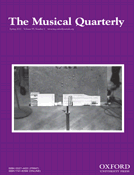
MUSICAL QUARTERLY
Advancing Musicology Through Critical DiscourseMUSICAL QUARTERLY, published by Oxford University Press Inc, is a distinguished journal in the field of music, with a publication history that stretches back to 1915. This esteemed journal, identifiable by its ISSN 0027-4631 and E-ISSN 1741-8399, provides a critical platform for scholarly discourse, analysis, and research in musicology and related disciplines, facilitating an understanding of both historical and contemporary musical practices. Although it operates without open access, it continues to attract a diverse readership of researchers, educators, and students alike, thanks to its well-curated articles and reviews that engage with music theory, history, and ethnomusicology. With a current Scopus rank of #119 out of 180 in the Arts and Humanities category and a 34th percentile ranking in Music, MUSICAL QUARTERLY plays a vital role in advancing knowledge and fostering collaboration within the music academic community. Its commitment to high-quality scholarship is reflected in its ongoing efforts to address the evolving landscape of music studies, making it an essential resource for anyone serious about exploring the rich tapestry of music scholarship.

Studia Universitatis Babes-Bolyai Musica
Bridging Disciplines in the World of MusicStudia Universitatis Babes-Bolyai Musica is a prestigious academic journal dedicated to the field of musicology, published by UNIV BABES-BOLYAI. Since its inception, it has strived to foster scholarly communication and share groundbreaking research that spans various music-related disciplines, including ethnomusicology, music theory, and performance studies. The journal operates under an Open Access model since 2021, ensuring that its content is freely accessible to a global audience of researchers, professionals, and students interested in advancing their knowledge and understanding of music. By providing a platform for high-quality, peer-reviewed articles, Studia Universitatis Babes-Bolyai Musica plays a vital role in promoting significant contributions to the evolving discourse in music studies. Its commitment to intellectual rigor and openness aligns with contemporary academic trends, making it an essential resource in the realm of music research.
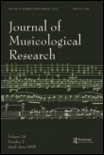
JOURNAL OF MUSICOLOGICAL RESEARCH
Illuminating the Cultural Impacts of MusicJOURNAL OF MUSICOLOGICAL RESEARCH, published by Taylor & Francis Ltd, is an esteemed platform that delves into the field of musicology, contributing to the ongoing dialogue in music research and scholarship since its establishment in 1979. With an ISSN of 0141-1896 and an E-ISSN of 1547-7304, this journal serves as a vital resource for researchers, professionals, and students, offering insights into diverse musicological topics. Although currently categorized in Q4 in Music with Scopus rankings placing it at #110 out of 180 in the Arts and Humanities field, its commitment to excellence and broader discourses in music studies is evident. The journal does not have Open Access options, yet it provides accessible content through reputable academic channels, fostering scholarly exchanges within the community. It aims to publish high-quality research that advances understanding of musical practices and cultural implications, making it a critical resource for those passionate about music and its myriad influences.
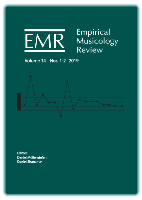
Empirical Musicology Review
Discovering New Dimensions of Music Through Empirical InquiryEmpirical Musicology Review is a pioneering journal in the field of musicology, published by the Ohio State University School of Music. Established as an open access journal since 2006, it aims to foster interdisciplinary research by providing a platform for scholars to disseminate empirical studies and analyses related to music. With ISSN 1559-5749, this journal plays a crucial role in expanding the understanding of music through methodological rigor and innovative practices, catering to researchers, professionals, and students alike. By promoting the accessibility of high-quality research, Empirical Musicology Review significantly contributes to the evolving landscape of music studies and enhances the global dialogue surrounding music's theoretical and practical dimensions. The journal's commitment to open access ensures that its valuable insights reach a broad audience, encouraging further exploration and collaboration within the musicology community.

Musicologist
Fostering a Vibrant Community of Music ScholarsMusicologist is a premier academic journal dedicated to the exploration and analysis of music theory, history, and practice, published by the esteemed Trabzon University State Conservatory in Turkey. With an ISSN of 2618-5652, this journal has been a vital platform for scholars since its inception in 2019, reflecting a commitment to fostering innovative research in the field of music. Recognized for its quality, the journal currently holds a Q2 ranking in the music category for 2023, placing it within the top segments of its discipline, as evidenced by its position at #72 out of 180 in the Scopus rankings, representing the 60th percentile. Although the journal employs a traditional publication model, it serves as a crucial repository for contemporary musicological discourse, aiming to advance knowledge and understanding within a vibrant academic community. Musicologist is not only a resource for seasoned researchers but also an invaluable tool for students and professionals alike, nurturing a comprehensive appreciation of music as an art form and scholarly pursuit.
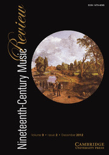
Nineteenth-Century Music Review
Fostering Critical Discourse on Historical MelodiesNineteenth-Century Music Review, published by CAMBRIDGE UNIVERSITY PRESS, is an essential scholarly journal in the field of musicology, particularly focusing on the vibrant and transformative period of the nineteenth century. This journal, archived under ISSN 1479-4098 and E-ISSN 2044-8414, serves as an invaluable platform for researchers, professionals, and students alike who are dedicated to exploring the multifaceted interactions between music and society during a time of significant cultural change. With its commitment to high-quality research and critical discourse, it embraces a diverse range of topics, including historical analysis, performance practice, and socio-cultural contexts within music. Operating from the United Kingdom, Nineteenth-Century Music Review is currently categorized in the fourth quartile of music journals according to Scopus rankings, offering a unique opportunity for emerging scholars to contribute to the expanding dialogue in this niche while also reaching a broad audience within the arts and humanities. Although the journal follows a traditional subscription-based model, it continues to be a pivotal resource for academic inquiry and knowledge dissemination in the landscape of nineteenth-century music history.

Zeitschrift der Gesellschaft fur Musiktheorie
Advancing the discourse of music theory.Zeitschrift der Gesellschaft für Musiktheorie (ISSN: 1862-6750, E-ISSN: 1862-6742) is a premier open-access journal published by the Gesellschaft Musiktheorie, devoted to advancing the field of music theory. Since its inception in 2003, it has provided a crucial platform for the dissemination of innovative research, theoretical discourse, and critical discussions pertinent to music analysis, pedagogy, and aesthetics. Based in Berlin, Germany, this journal not only showcases the latest in musicological scholarship but also fosters a vibrant community of researchers, practitioners, and educators. With a commitment to accessibility, all published articles are freely available, enhancing the reach and impact of the work within the global music community. This journal is essential reading for anyone seeking to deepen their understanding of musical structures and practices, making it an invaluable resource for students, academics, and music professionals alike.

RIVISTA ITALIANA DI MUSICOLOGIA
Connecting Scholars Through the Language of MusicRIVISTA ITALIANA DI MUSICOLOGIA, published by the Italian Society of Musicology, is a distinguished journal dedicated to the field of musicology, offering a platform for scholarly research and discourse on a wide array of musical topics. With an ISSN of 0035-6867 and an E-ISSN of 2036-5586, this journal has contributed significantly to the understanding of music in cultural and historical contexts. Although the scope of coverage was marked from 2003 to 2008 in renowned databases like Scopus, the journal continues to serve as an invaluable resource for researchers, educators, and students embroiled in music studies. Its emphasis on rigorous research and critical analysis makes it a vital asset for anyone seeking to deepen their knowledge of musicological inquiry. While not an open-access publication, the RIVISTA ITALIANA DI MUSICOLOGIA remains a prestigious outlet for scholarly contributions that reach audiences eager to explore the complexities of musical heritage.

OR SPECTRUM
Unveiling New Perspectives in Operations and Management ScienceOR SPECTRUM, published by SPRINGER, is a premier journal in the fields of Business, Management, and Operations Research, with a distinguished reputation established since its inception in 1979. As of 2023, it holds an impressive Q1 ranking in Business, Management and Accounting (miscellaneous) and a Q2 ranking in Management Science and Operations Research. The journal, which is indexed under ISSN 0171-6468 and E-ISSN 1436-6304, boasts a significant impact factor within its scope, making it a pivotal resource for cutting-edge research and theoretical developments. With access options that favor traditional subscriptions, OR SPECTRUM offers a robust platform for the dissemination of innovative ideas and methodologies, vital for academics, professionals, and students alike. The journal's commitment to excellence ensures its critical role in enhancing the understanding and application of operational research techniques around the globe.
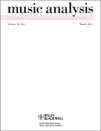
MUSIC ANALYSIS
Illuminating the Intersection of Music and CultureMUSIC ANALYSIS, published by WILEY, is a prestigious journal in the field of musicology, recognized for its critical contributions to the analysis of music and its myriad influences on culture and society. With an ISSN of 0262-5245 and an E-ISSN of 1468-2249, this journal has established itself as a vital resource for researchers, professionals, and students alike, boasting a Q1 ranking in the 2023 category of Music. As part of a highly competitive field, it ranks 70th out of 180 in the Arts and Humanities Music category on Scopus, positioning it within the 61st percentile. MUSIC ANALYSIS serves as an essential platform for innovative research and insightful discourse, engaging with musical theory, practice, and education from 1996 to 2024. Its commitment to fostering rigorous scholarship makes it indispensable for those seeking to deepen their understanding of music and its analytical frameworks. Although it does not offer Open Access options, its relevance and impact in the genre ensure accessibility through institutional subscriptions and university libraries.